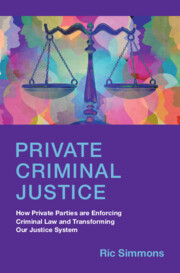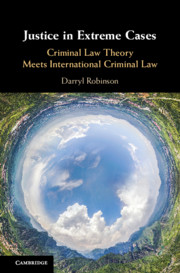Refine search
Actions for selected content:
7 results
1 - Activating the Criminal Law
- from Part I - Purpose
-
- Book:
- The Boundaries of Blame
- Published online:
- 26 July 2025
- Print publication:
- 14 August 2025, pp 9-46
-
- Chapter
- Export citation
1 - Criminal Justice without the State
-
- Book:
- Private Criminal Justice
- Published online:
- 21 September 2023
- Print publication:
- 05 October 2023, pp 9-28
-
- Chapter
- Export citation
2 - A Brief History of Crime
-
- Book:
- Private Criminal Justice
- Published online:
- 21 September 2023
- Print publication:
- 05 October 2023, pp 29-39
-
- Chapter
- Export citation

Private Criminal Justice
- How Private Parties are Enforcing Criminal Law and Transforming Our Justice System
-
- Published online:
- 21 September 2023
- Print publication:
- 05 October 2023

Justice in Extreme Cases
- Criminal Law Theory Meets International Criminal Law
-
- Published online:
- 17 December 2020
- Print publication:
- 17 December 2020
4 - Fundamentals without Foundations
- from Part II - Proposed Solution: A Humanist, Coherentist, Deontic Account
-
- Book:
- Justice in Extreme Cases
- Published online:
- 17 December 2020
- Print publication:
- 17 December 2020, pp 85-118
-
- Chapter
- Export citation
2 - The Identity Crisis of International Criminal Law
- from Part I - Introduction and Problem
-
- Book:
- Justice in Extreme Cases
- Published online:
- 17 December 2020
- Print publication:
- 17 December 2020, pp 20-56
-
- Chapter
- Export citation
